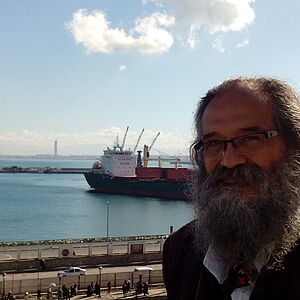
Shahid Rahman
Présentation
Interaction et la constitution du sens et savoirs: Mon travail concerne l'étude diachronique et synchronique de l'interaction rationnelle, ses enjeux philosophiques, sémantiques et épistémologiques. Ma principale contribution a ainsi été le développement de la logique dialogique comme cadre général de construction, de combinaison et d’études des différentes logiques. L’idée philosophique fondamentale sous-jacente à mes recherches est celle d’une sémantique pragmatique, basée sur les pratiques argumentatives. Selon cette perspective l’approche dialogique fournit une théorie de la signification qui diffère des cadres formelles plus connues telles que la théorie des modèles et la théorie de la preuve. Dans cette optique, la manière dont ces jeux sont régulés constitue une part cruciale de la théorie dialogique de la signification. C’est notamment au niveau des règles que la flexibilité du cadre dialogique apparaît le plus clairement dans la mesure où des variations dans les règles du jeu, reflétant diverses pratiques argumentatives auxquelles on peut s’intéresser, permettent de fournir des sémantiques à de nombreuses logiques - telles que, entre autres, la logique de le épistémologie Jain (dans la tradition de l’ Inde classique), la théorie médiévale des Obligationes, quelques fragment de la théorie de l’identité chez Avicenne, logiques modales normales, les logiques modales hybrides, les logiques libres (logiques de la fiction), les logiques modales non-normales, les logiques de la pertinence, les logiques paraconsistantes, la logique connexive, les logiques épistémiques dynamiques, les logiques pour la révision de croyances, la logique linaire, et la logique dans la théorie constructive de types (CTT). Cela induit une reconstruction à la fois systématique et historique des pratiques inférentielles, dans laquelle les notions de proposition et d’inférence sont repensées dynamiquement, comme interactions spécifiques entre des agents à l’intérieur d’une structure de jeu adéquate, et dans laquelle la validité logique est alors définie en termes de stratégies gagnantes.
https://univ-lille3.academia.edu/ShahidRahman/CurriculumVitae
À présent, mes recherches concernent
- Les implications de la théorie constructive de types (CTT) dans l’étude des forces dynamiques et épistémiques à l’origine de la fondation des mathématiques et de la logique.
- Le développement d’une fondation interactive de la signification en logique basée sur la CTT et l'étude des racines historiques de l'approche dialogique incluant: Platon, Aristote, la tradition Arabe, la logique Jain.
- le développement d’une fondation interactive de la pratique du Dialogue, basée sur la CTT, pour fournir ainsi une théorie dialogique de la signification appliquée à l’étude de l’argumentation et de la conversation dans le langage naturel.
Dans un dernier volet, mes recherches explorent – et contestent - l’incompatibilité (historique et systématique) entre les paradigmes juridiques et mathématiques de raisonnement.
https://www.academia.edu/35518671/Report_Researches_at_the_Lab_STL_UMR_8163_2013_18
Collections internationales de Livres.
While some years ago Argumentation and interaction had a secondary role in research, nowadays this field constitutes the focus of important disciplinary and interdisciplinary historic and sytematic studies on, among others: The Dialogical Stance on Knowledge, Meaning and Logic,, Argumentation Theory, Critical Thinking, Conversation, Rhetoric; Orality. see https://plato.stanford.edu/entries/logic-dialogical/
Let us stress that that the UMR axis Argumentation is one of the rare cases in in the SHS France in relation to it publications. Indeed, Argumentation has its own international collection of books that promotes and published trans and interdisciplinary work in the field of argumentation, fostered by the research axis Argumentation at the UMR-ST and by the MESHS-Nord-Pas-de-Calais. Moreover, it promotes the perspectives of the Humanities and Social Sciences, and includes in its editorial board members of the laboratory and researchers of Lille 1 and 2, an published during the period 2013-17, 14 volumes involving many researchers and doctorates of the laboratory beyond the work of international researchers in the field. The collection also published work produced by the umr-axis Savoirs, œuvres, discours and Forme et Sens
More precisely, the researches have motivated the creation of the edition of 6 international collections of books fostered by the UMR STL and the MESH-Nord-Pas-de Calai, namely
- avec (avant John Symons) J. Redmond chez Kluwer-Springer: Logic, Epistemology and the Unity of Science. (48 ouvrages actuellement) - repertorié par SCOPUS, http://www.springeronline.com/series/6936
- avec J. Redmond chez Springer (new Series part of the project ADA): Interdisciplinary approaches to Reasoning: Perspectives from the Humanities and Social Sciences, (23 ouvrages actuellement) Repertorié par SCOPUS, http://www.springer.com/series/11547
- (3); avec D. Gabbay et J. Redmond chez King’s College: Cahiers de Logique et Epistémologie, (25 ouvrages actuellement), http://www.collegepublications.co.uk/cahiers/
- (4), avec N. Clerbout and M. Fontaine, chez King’s College: Dialogues (7 ouvrages actuellement), http://www.collegepublications.co.uk/dialogues/
- avec J. Redmond, R. López Orellana chez King’s College:Cuadernos de Logica, Epistemologia y Lenguaje. (16 ouvrages actuellement), http://www.collegepublications.co.uk/cuadernos/
- avec M. Armgardt et J. Woods, chez College Publications Logic and Law (5 ouvrages actuellement). https://www.collegepublications.co.uk/LS/



